The American Agriculture Industry is Making (a Little) Room for Luxury Fruit
A few American companies are cashing in on the exclusive produce trend.
The American Agriculture Industry is Making (a Little) Room for Luxury Fruit
A few American companies are cashing in on the exclusive produce trend.
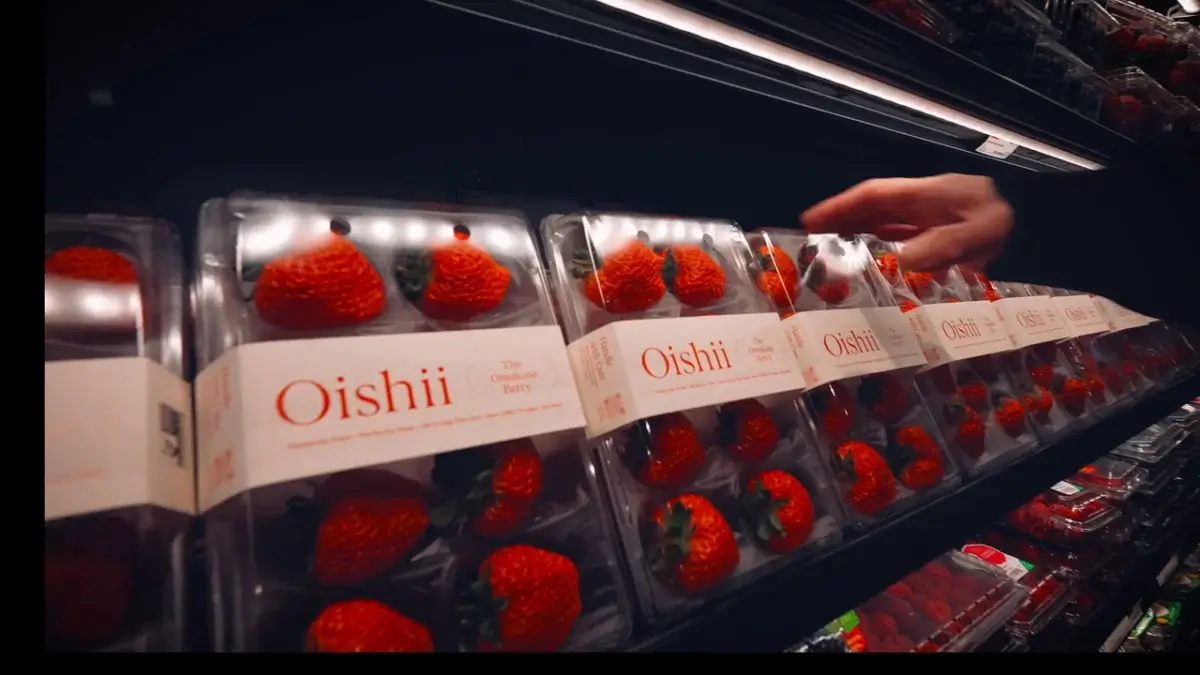
Omakase berries at Whole Foods Market.Photography via Oishii.
Would you pay $50 for six pears?
Luxury fruit—a longtime cultural staple in Asian markets—has finally made landfall in the US. Social media influencers are shelling out cash to unbox packages of exclusive produce on TikTok, and high-end retailers such as Whole Foods Market are now displaying expensive fruit on their store shelves.
Several American companies—Oishii, Melissa’s Produce, and Harry & David among them—stand at the helm of the emerging market. Their growing techniques, produce varieties, and, most notably, their price points, set them apart from the traditional agriculture industry.
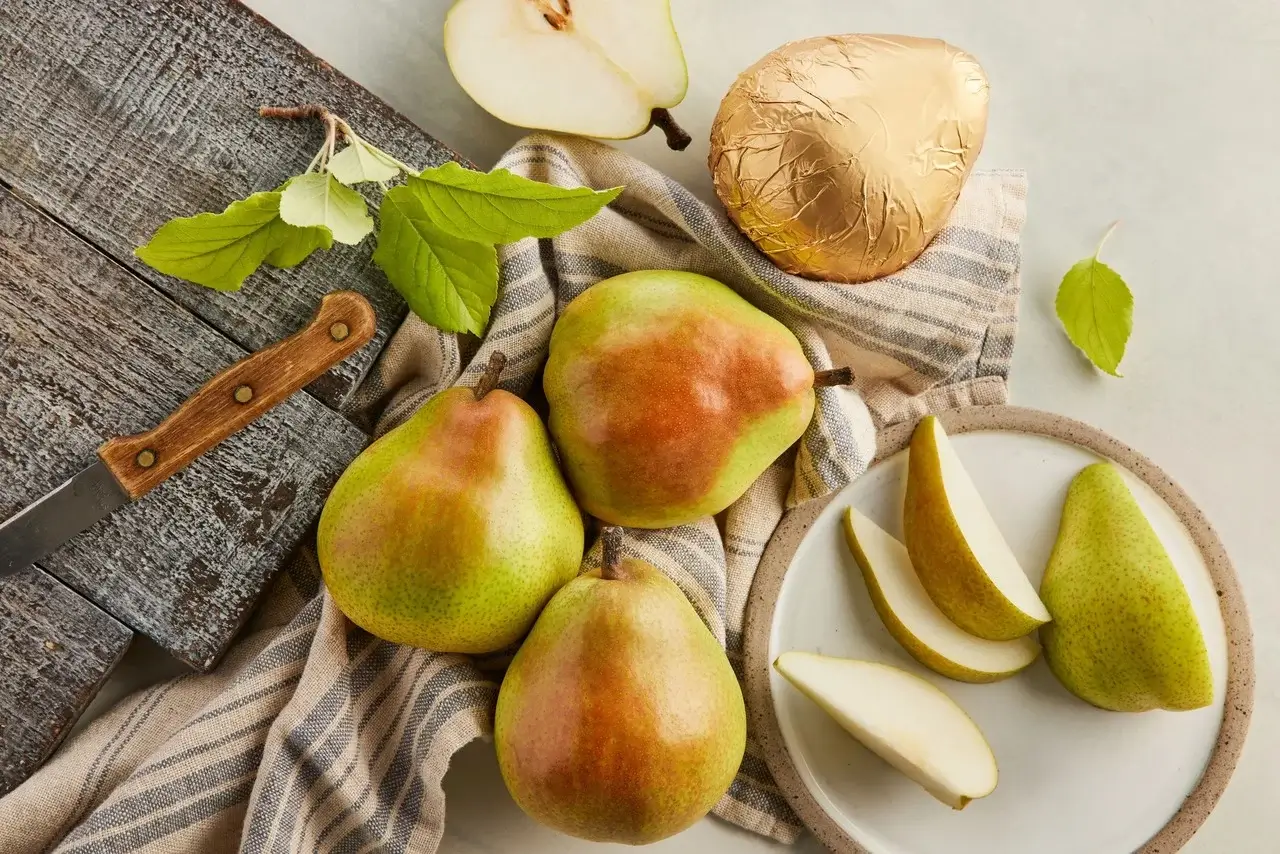
While supermarket shoppers typically cough up a few dollars for a pint of strawberries, a box of six to eight Oishii Omakase Berries costs around $12 through online grocery company FreshDirect. In the US, domestic strawberries usually come from California and Florida or they’re imported internationally from Mexico.
To Oishii CEO and co-founder Hiroki Koga, the taste of his Japanese varieties are worth it—twice as sweet as the strawberries found at traditional grocery stores, he says. Koga moved to the US from Japan in 2015. Following his first bites of American produce, a “shocked” Koga made up his mind to introduce quality fruits and vegetables to the market.
He founded his vertical farm startup in 2016, where the enclosed New Jersey farm is weather-resistant, simulating Japanese climate conditions, says Koga. The facility doesn’t occupy farmland: Instead, it was once a plastic factory. Oishii recycles its water and doesn’t use pesticides.
Its team, which is made up of more than 200 employees, figured out how to keep bees happy in a sunless environment—a task that was “thought to be impossible,” says Koga—so the insects pollinate the produce. Oishii’s farm mimics daylight and nighttime, so its bees act like their wild counterparts would. Growers also monitor their health.
“That’s why our strawberries are always the exact same quality every single day, 365 days a year,” says Koga.
Foodies and new parents make up the largest consumer demographics for Oishii’s premium fruit, says Koga. But his hope is to drop the price of his products one day.
“What we’re trying to do is actually not build a luxury fruit brand,” says Koga. “Our goal from the start has always been to democratize this high-quality produce and make it more accessible to as many people as possible.”
“Our goal from the start has always been to democratize this high-quality produce and make it more accessible to as many people as possible.”
Meanwhile, Melissa’s Produce maintains a longstanding reputation for dealing in rare and luxury produce. Founded in 1984, the company in Vernon, CA serves as the nation’s largest variety supplier of produce.
“When it comes to $400 pineapples, we’re the only company in town that offers them for sale,” says Robert Schueller, director of public relations.
He’s referring to the Rubyglow pineapple, a $396 fruit grown by Fresh Del Monte Produce Inc. Comparatively, the market price for a regular pineapple is around $5, says Schueller. The next Rubyglow harvest will only yield between 100 and 150 fruits, he adds.
“The thing is that the luxury produce market is small,” says Schueller. “You’re not going to be able to grow a lot of it because you’re not going to be able to market to everyone.”
In the spring of 2024, Melissa’s Produce sold 80 Rubyglow pineapples online. More than 150 people have signed up for the waiting list for the next available batch, says Schueller.
The company’s clientele includes chefs at white tablecloth restaurants and sports stadiums. “Chefs have always been the best [spokespeople]in introducing these new varieties, especially these high-end varieties, onto their menu and onto the plate,” says Schueller.
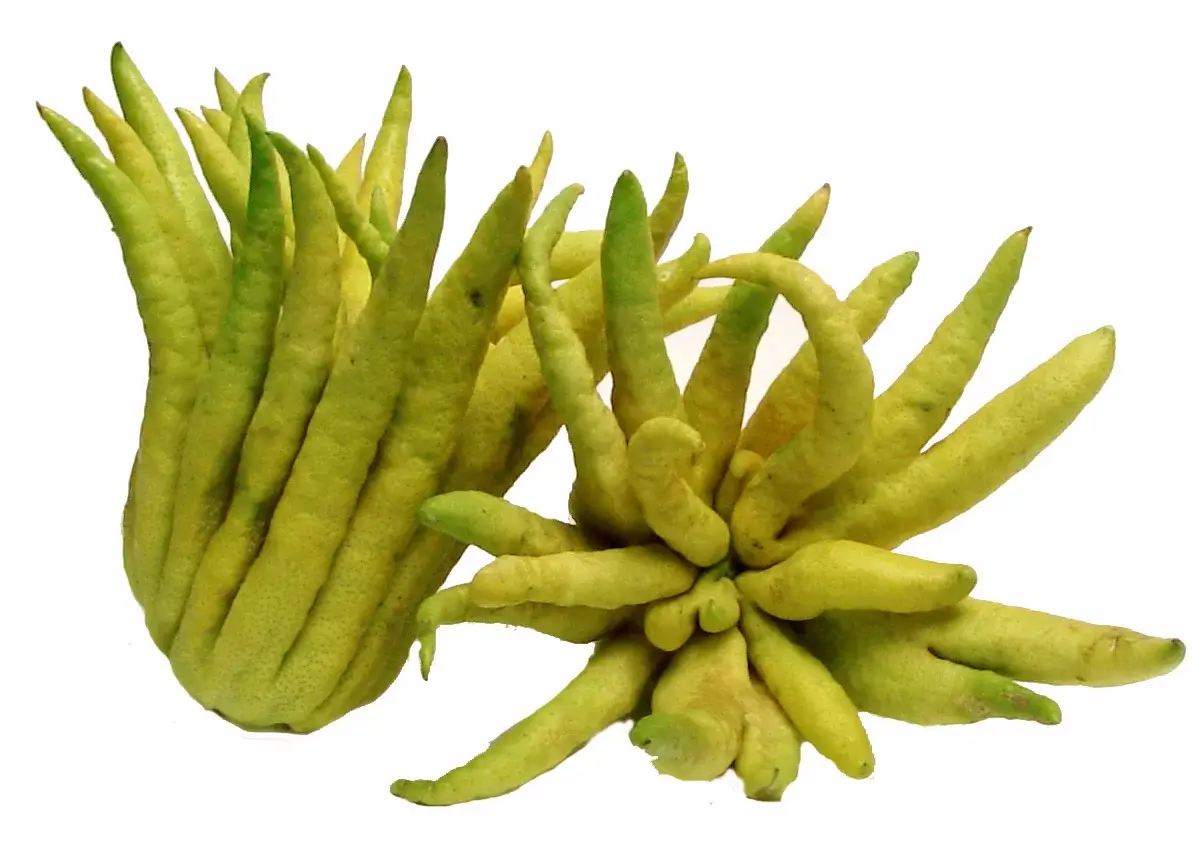
Several other luxury produce items are planted stateside for Melissa’s Produce. About 25 years ago, the company introduced Buddha’s Hand, a citron that is particularly popular during the Lunar New Year season because it’s gifted for luck. Its season runs from September through February. Priced at $8 per pound, the citron’s average weight ranges from one to three pounds
Cherimoyas, or custard apples, carry a price tag of about $54 for a 3-lb. pack. They’re grown in California from November through April, then imported from Chile for the rest of the year.
Both Buddha’s Hand and cherimoya are grown outside in fields. States such as California and Florida provide ideal temperatures, given their general absence of frost and extreme heat.
It’s not just chefs and foodies snapping up luxury fruit. Some folks do it for the social media content, says Greg Sarley, senior vice president of merchandising at Harry & David, a food and gift company. “A unique fruit can go viral, sparking curiosity and desire,” he says.
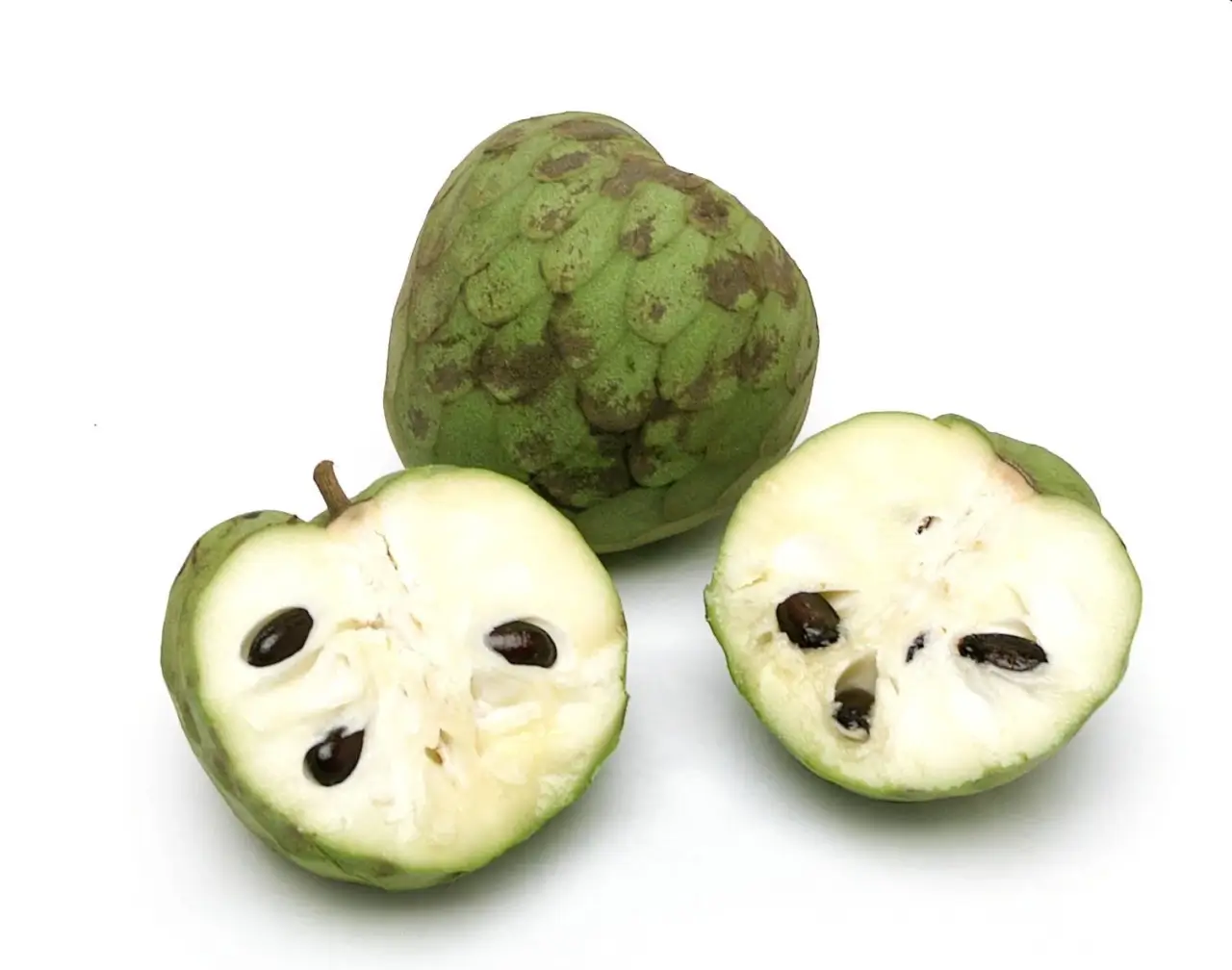
Sarley referred to his company as “a pioneer in the luxury fruit market.” Across 1,700 acres in Medford, Ore., Harry & David grows pears, with French variety Royal Riviera pears counting as a popular offering that the company has sold since 1934.
“They require meticulous care,” says Sarley. To give the pears time to sweeten, they’re stored in the cold for at least 30 days after harvest. A 5-lb. box sells for about $40.
Meanwhile, a box of the Royal Riviera Cream of the Crop pears—depicted as “the king-sized version of our famous pears”—carries a price tag of $50 for six or seven pieces of fruit.
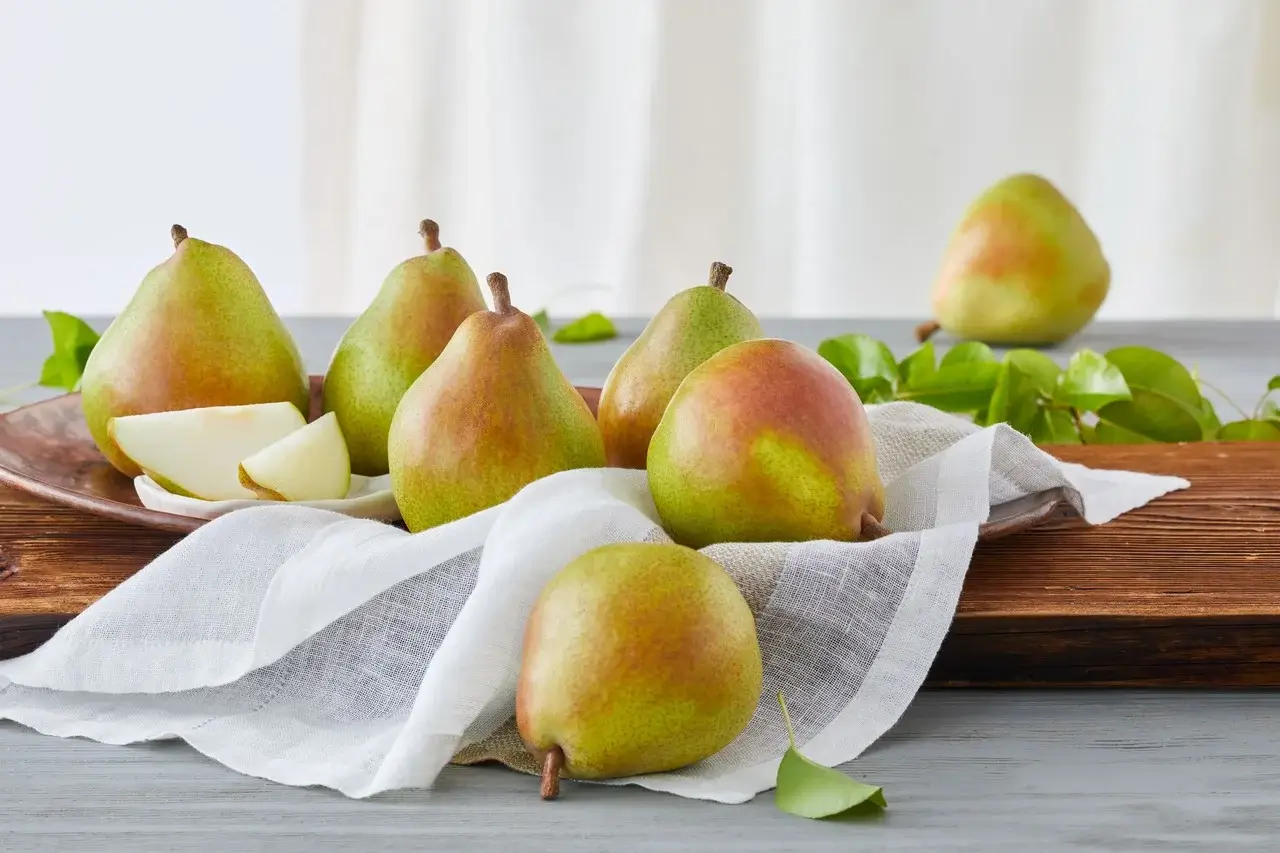
Harry & David works with other growers, too, including mango farmers in Arizona. The tropical fruits are picked, then packed that day, for a juicier taste, says Sarley.
In the opinion of Schueller at Melissa’s Produce, the size of the American luxury fruit market may grow in the future, but it will stay exclusive. That’s because he expects prices to remain high as growers continue producing limited batches, keeping supply low.
“If they grow more, it doesn’t mean they’re going to sell that many more,” says Schueller. “That’s why they don’t make a million Ferraris every year.”
Follow us
This work is licensed under a Creative Commons Attribution-NoDerivatives 4.0 International License.
Want to republish a Modern Farmer story?
We are happy for Modern Farmer stories to be shared, and encourage you to republish our articles for your audience. When doing so, we ask that you follow these guidelines:
Please credit us and our writers
For the author byline, please use “Author Name, Modern Farmer.” At the top of our stories, if on the web, please include this text and link: “This story was originally published by Modern Farmer.”
Please make sure to include a link back to either our home page or the article URL.
At the bottom of the story, please include the following text:
“Modern Farmer is a nonprofit initiative dedicated to raising awareness and catalyzing action at the intersection of food, agriculture, and society. Read more at <link>Modern Farmer</link>.”
Use our widget
We’d like to be able to track our stories, so we ask that if you republish our content, you do so using our widget (located on the left hand side of the article). The HTML code has a built-in tracker that tells us the data and domain where the story was published, as well as view counts.
Check the image requirements
It’s your responsibility to confirm you're licensed to republish images in our articles. Some images, such as those from commercial providers, don't allow their images to be republished without permission or payment. Copyright terms are generally listed in the image caption and attribution. You are welcome to omit our images or substitute with your own. Charts and interactive graphics follow the same rules.
Don’t change too much. Or, ask us first.
Articles must be republished in their entirety. It’s okay to change references to time (“today” to “yesterday”) or location (“Iowa City, IA” to “here”). But please keep everything else the same.
If you feel strongly that a more material edit needs to be made, get in touch with us at [email protected]. We’re happy to discuss it with the original author, but we must have prior approval for changes before publication.
Special cases
Extracts. You may run the first few lines or paragraphs of the article and then say: “Read the full article at Modern Farmer” with a link back to the original article.
Quotes. You may quote authors provided you include a link back to the article URL.
Translations. These require writer approval. To inquire about translation of a Modern Farmer article, contact us at [email protected]
Signed consent / copyright release forms. These are not required, provided you are following these guidelines.
Print. Articles can be republished in print under these same rules, with the exception that you do not need to include the links.
Tag us
When sharing the story on social media, please tag us using the following: - Twitter (@ModFarm) - Facebook (@ModernFarmerMedia) - Instagram (@modfarm)
Use our content respectfully
Modern Farmer is a nonprofit and as such we share our content for free and in good faith in order to reach new audiences. Respectfully,
No selling ads against our stories. It’s okay to put our stories on pages with ads.
Don’t republish our material wholesale, or automatically; you need to select stories to be republished individually.
You have no rights to sell, license, syndicate, or otherwise represent yourself as the authorized owner of our material to any third parties. This means that you cannot actively publish or submit our work for syndication to third party platforms or apps like Apple News or Google News. We understand that publishers cannot fully control when certain third parties automatically summarize or crawl content from publishers’ own sites.
Keep in touch
We want to hear from you if you love Modern Farmer content, have a collaboration idea, or anything else to share. As a nonprofit outlet, we work in service of our community and are always open to comments, feedback, and ideas. Contact us at [email protected].by Megan Ulu-Lani Boyanton, Modern Farmer
September 20, 2024
Modern Farmer Weekly
Solutions Hub
Innovations, ideas and inspiration. Actionable solutions for a resilient food system.
ExploreShare With Us
We want to hear from Modern Farmer readers who have thoughtful commentary, actionable solutions, or helpful ideas to share.
SubmitNecessary cookies are absolutely essential for the website to function properly. This category only includes cookies that ensures basic functionalities and security features of the website. These cookies do not store any personal information.
Any cookies that may not be particularly necessary for the website to function and are used specifically to collect user personal data via analytics, ads, other embedded contents are termed as non-necessary cookies.
Have to give it them a try
The rise of luxury fruit in American agriculture reflects a growing demand for unique, high-quality produce. It highlights consumer interest in premium, sustainable, and exotic fruits, which could reshape farming practices and offer small growers opportunities to tap into niche markets for greater profitability and diversification. Your article is very thoughtful and interesting.